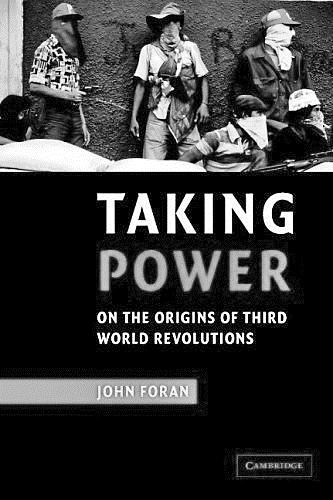
Not all social and political revolutions have roots in democracy, but, according to University of California, Santa Barbara sociologist John Foran, those most likely to succeed do stem from popular participation by broad coalitions of people.
In his new book, Taking Power – On the Origins of Third World Revolutions (Cambridge University Press), Foran studies three dozen Third World revolutions since 1910 and advances a new theory that integrates the political, economic and cultural factors that inspired them. Using qualitative comparative analysis he also attempts to explain why so few revolutions actually do succeed. Described by scholars as the most comprehensive study of Third World revolutions now available, the book has just been named a co-winner of the Pacific Sociological Association's 2006 Distinguished Scholarship prize. Foran will receive the award at the group's annual meeting in Los Angeles next month.
Taking a sociological as well as a historical view, Foran compares 36 political and social revolutions and notes that only a handful succeeded. He defines a successful revolution as one in which new leaders take power and hold it long enough to make differences in the lives of the people who support them.
"Revolutions are fascinating because they're rare efforts by people to shape society for the better," says Foran. "That's the dream, the goal, no matter what the outcome."
Foran examines particular sets of revolutions, looking first at the great social revolutions of Mexico, China, Cuba, Iran, and Nicaragua from 1910 to 1979. He moves on to the anti-colonial revolutions in Algeria, Vietnam, Angola, Mozambique and Zimbabwe that took place between the 1940s and the 1970s. He then turns his attention to the reversed revolutions of Iran, Guatemala, Bolivia, Chile, Jamaica, Grenada and Nicaragua from the 1940s through 1980s. Finally, he touches on the failed revolutionary attempts in El Salvador, Algeria, Peru, as well as China's Tiananmen Square protests and political revolutions in the Philippines, Haiti, Zaire, and South Africa. He concludes with sustained speculation about the future of revolutions in the post-Cold War, post 9/11 age of globalization.
Examining the economic, political and cultural dimensions of each revolution, Foran identifies economic inequality as a common underlying factor. "Revolution is about reversing economic inequality and putting power into the people's hands," he says. "If you find ways to involve people in their own governance, societies flourish."
Foran has been a professor in the sociology department at UC Santa Barbara since 1988.
His scholarly interests span development and globalization, social change, Middle East studies, Latin American studies, comparative historical methods, Third World cultural studies, social theory, political sociology, and social movements. He has won several awards for his teaching, and he developed an innovative Web site on Third World issues for teachers (www.soc.ucsb.edu/projects/casemethod/). He currently serves as the sociology department's director of undergraduate studies and in the past has served as the department's vice chair. He also has been director of the Program in Latin American and Iberian Studies at UCSB, and Visiting Professor of Sociology and Latin American Studies at Smith College.
Foran's first book was Fragile Resistance: Social Transformation in Iran from 1500 to the Revolution (Westview Press, 1993), which also won the Pacific Sociological Association's award for best book of 1994. In addition, he has edited Theorizing Revolutions (Routledge, 1997), The Future of Revolutions: Rethinking Radical Change in the Age of Globalization (Zed Books, 2003); and co-edited the volume Feminist Futures: Re-imagining Women, Culture and Development (Zed Books, 2003) with Kum-Kum Bhavnani, a UCSB sociology professor, and Priya A. Kurian, a senior lecturer in political science and public policy at Waikato University in New Zealand.
Foran's next projects include a textbook on revolutions, a sociology of U.S. foreign policy, and a long-term study of the global justice movement.
Related Links



